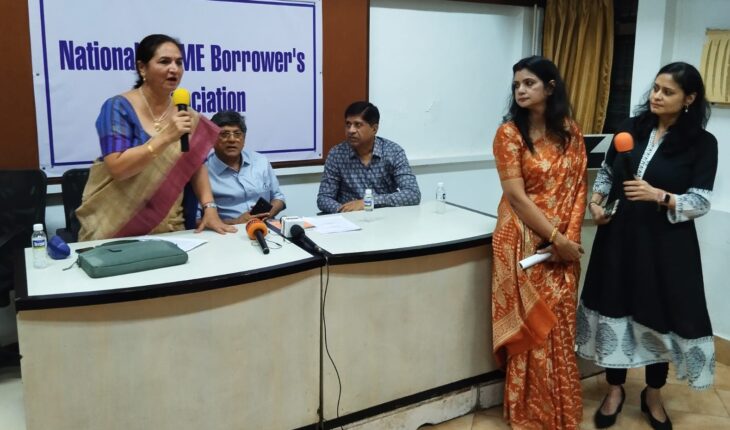Mumbai: An economic “Pandora’s Box” is likely to open up in India following the Micro, Small and Medium Enterprises (MSME) Borrowers Association highlighting the condition of MSME borrowers in India, who constitute 90% of entrepreneurs in the country but are facing a “distressing” future.
The National MSME Borrowers Association, in a press conference recently at the Mumbai Press Club, focused on the “failure of the authorities – particularly the RBI, Banks and financial institutions — to give effect to a notification dated 29-5-2015 under Section 9 of the MSMED Act.”
“The MSMED Act and the Notification was enacted taking note of the fact that MSMEs are the backbone of the Indian economy, particularly in generation of employment and creation – and equitable distribution – of wealth,” according to a MSMEBA release.
“The notification is mandatory. Not a single MSME was left unaffected during the COVID-19 period and many suffered huge losses that hampered their bank loan repayments,” said Advocate Mathews J. Nedumpara, who has been fighting for the rights of the MSMEs and had obtained a Supreme Court judgement (M/s. PRO KNITS versus Board of Directors of Canara Bank) in their favour.
“However, despite the Supreme Court judgement, the MSMEs still face threat of dispossession from their homes and enterprises because of reluctance to give effect to this judgement, and thus benefiting the ARCs and those who do business in buying the assets of MSMEs in stress,” he said.
Alleging that ARCs and vested interests “have become billionaires overnight by acquiring the properties of affected MSMEs through crafty means,” Nedumpara said that gross failure on the part of the RBI and the Regulator to implement the Notification – and even the nationalized banks’ board of directors not constituting a Committee in this regard – “cannot be an innocent failure.”
Chartered accountant Manisha Mehta, President, MSMEBA, who is one of the affected MSMEs, described how she ran from pillar to post to get justice. “I founded in 1996 Perfect Infraengineers, that was listed by 2015 on the NSE MSME platform with 300 employees for manufacturing an award-winning, eco-friendly, energy-saving product.”
However, problems like bank overcharging interest rate, COVID-19 lockdown and moratorium made her seek financial aid under the new ECLGS scheme for MSMEs. Then, on July 20, 2020 her bank claimed that her company was an NPA – rendering it ineligible for aid and has since then frozen all her current accounts, while illegally possessing and attempting to sell her immovable properties under the SARFESAI Act, she claimed.
Mehta said that the MSMEBA would be conducting a nationwide public campaign to highlight the “injustice” caused to MSMEs, the violation of their rights and the need for MSMEs to be informed of their rights while also being vigilant and fighting in unity for this.
“The MSMEs, which today includes the trading and service sectors, involves the lives and livelihoods of millions of Indian families. These small-time entrepreneurs face great difficulty to avail credit facilities even from nationalized banks.”
“The Government of India — while keeping in mind that this vital priority sector should not perish but grow robustly – made it mandatory for banks and financial institutions to reach out to MSMEs and extend credit facilities even without collateral securities.”
“Likewise, those who purchase goods from MSMEs and fail to pay them on time are mandated to pay interest at three times the bank rate. The monies due to the MSMEs can be recovered as though a public debt through revenue recovery proceedings.”
Lamenting that “all this is only on paper,” Mehta said the notification dated 29-5-2015 “prohibits the bank from classifying the MSME account as NPA, and also initiating recovery steps without constituting a committee.”
Noting that not a single bank or financial institution — including the SBI – has ever constituted a committee or made any attempt towards resolution of the stress, she said that for the last 10 years, “recovery action is being initiated by throwing the notification into the bin.”
“Thousands of MSMEs were brought to total ruin with forceful possession being taken of their establishments, factories and homes, and when they knock on the doors of courts – the NCLT, DRT, High Court and Supreme Court – relief is declined for reasons difficult to fathom.”
The MSMEBA stated that though India has the largest workforce in the world with about 80 crores people aged between 20 to 60, majority of them are unemployed or underemployed – where India faces the largest problem of unemployment – and highlights the need for building a +robust+ MSME sector.
The Ministry of Micro, Small and Medium Enterprises, Government of India, vide their Gazette Notification dated May 29, 2015, had notified a “Framework for Revival and Rehabilitation of Micro, Small and Medium Enterprises, to provide a simpler and faster mechanism to address the stress in the accounts of MSMEs and to facilitate the promotion and development of MSMEs.
The Reserve Bank was advised to issue necessary instructions to banks for effective implementation and monitoring of this Framework.
After carrying out certain changes in the captioned Framework in consultation with the Indian Government, Ministry of MSME, so as to make it compatible with the existing regulatory guidelines on ‘Income Recognition, Asset Classification and provisioning pertaining to Advances’ issued to banks by RBI, the guidelines on the captioned Framework along with operating instructions were issued to banks on March 17, 2016.
The Revival and rehabilitation of MSME units having loan limits upto Rs 25 crore would be undertaken under this Framework. Banks were required to put into place their own Board-approved policy to operationalize the Framework not later than June 30, 2016.
The revised Framework superseded earlier guidelines on Rehabilitation of Sick Micro and Small Enterprises issued vide circular RPCD. CO> MSME & NFS.BC.40/06.02.31/2012-2013 date November 1, 2012, except those relating to Reliefs and Concessions for Rehabilitation of Potentially Viable Units and One Time Settlement, mentioned in the said circular.
The salient features of the Framework are: Before a loan account of an MSME turns into a Non-Performing Asset (NPA), banks or creditors should identify incipient stress in the account by creating three sub-categories under the Special Mention Account (SMA) category as given under this Framework; Any MSME borrower may also voluntarily initiate proceedings under this Framework; Committee approach to be adopted for deciding corrective action plan; Time lines have been fixed for taking various decisions under the Framework.
The Supreme Court, in its judgement dated 1-8-2024 on the appeal by M/S PRO KNITS versus Board of Directors of Canara Bank, stated that “When it is mandatory or obligatory on the part of Banks to follow the Instructions/Directions issue by the Central Government and the Reserve Bank of India with regard to the Framework for Revival and rehabilitation of MSMEs, it would be equally incumbent on the part of the concerned MSMEs to be vigilant enough to follow the process laid down under the said Framework, and bring to the notice of the concerned Banks, by producing authenticated and verifiable documents/material to show its eligibility to get the benefit of the said Framework.”
The Judgement stated that “The instructions issued by the Central Government under Section 9 of the MSMED Act and by the RBI under Section 21 and Section 35A have statutory force and are binding to all the Banking companies.”
MSMEBA’s advocate Mathews J. Nedumpara said “The Supreme Court judgement came as a ‘big relief’ because, for almost a decade, high courts, NCLTs and DRTs refused to give any relief to the stressed MSMEs. However, the judgement actually helps the financially-literate and well-off MSMEs because only literate MSMEs benefited from this judgement.”
“Financial Illiteracy among MSMEs is 92% and the MSMEs could not therefore avail the benefits of the Notification,” MSME Borrowers Association President Manisha Mehta said while calling for unity among the MSMEs — “the victims of the draconian Enactments such as SARFAESI Act, 2002 and IBC, 2016.”
She said the MSMEBA was making inquiries and a study as to how stressed MSMEs in every state of India could be revived through the best recovery process.
Another case in point of stressed MSMEs is registered woman entrepreneur Mrs Sadhana Bharat Rai, who ran her own petrol pump – Shrishti Petroleumin Raigad, Maharashtra and, for business expansion, took a Rs 2.5 crore loan with her flat (then valued at Rs 5 crores) as collateral from an NBFC. For another Rs 50 lakh loan, she mortgaged her HPCL-leased petrol pump land to the NBFC.
However, missing a few EMI payments due to financial difficulty saw the NBFC asking for 36% interest on the loan and collecting Rs 65 lakhs from her before assigning the client to a Bank, which demanded Rs 5 crores from her and instituted proceedings in the High Court — under SARFAESI Act – which ordered the Court Receiver to take possession of her flat, and the Tehsildar to take possession of her land, Rai said.
Rai then approached the Supreme Court, which highlighted mandatory protection of stressed MSMEs like her. However, the Bank sold her land for Rs 4.11 crores and is now claiming total outstanding of Rs 8 crores in the High court, while the Petrol pump, which was operational, was shut down, she added.
The MSMEBA’s advocate Mathews J. Nedumpara said that Mrs Rai was not aware about the Act and only came to know about it after contacting him and deciding to highlight her situation of being “homeless” and “her business being taken away from her.”
“When such things happen, the MSMEs’ entrepreneurial spirit is dampened and goes into depression,” he said while noting that another problem was: majority of MSME’s were not registered with only the registered ones could availing the benefits of the Act, though awareness efforts were on to get them all registered.





